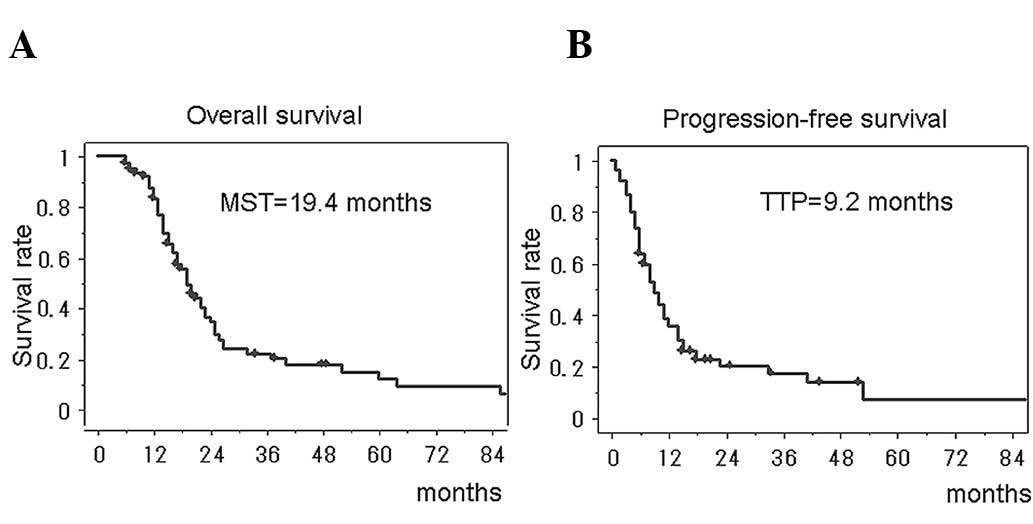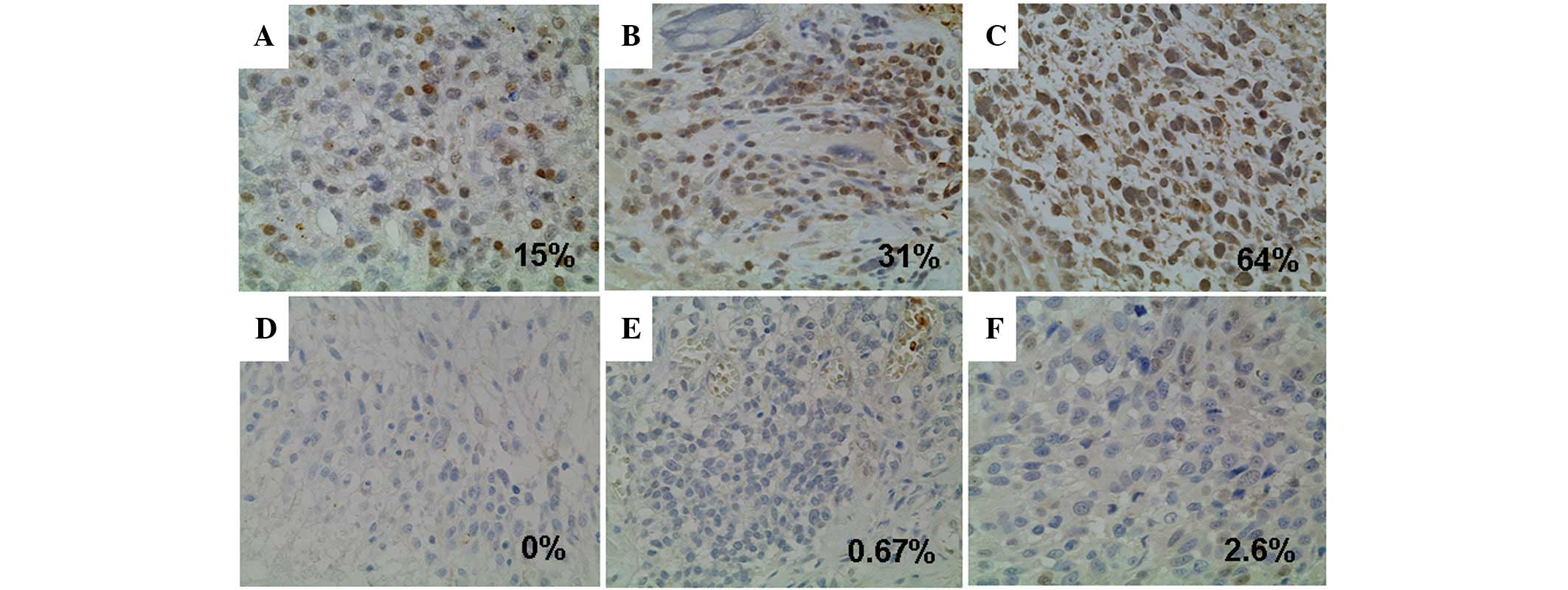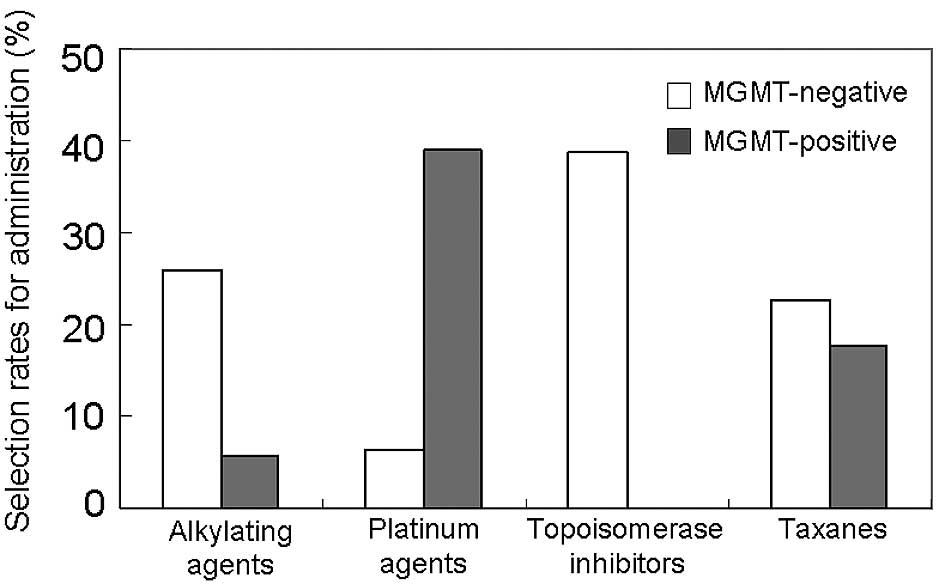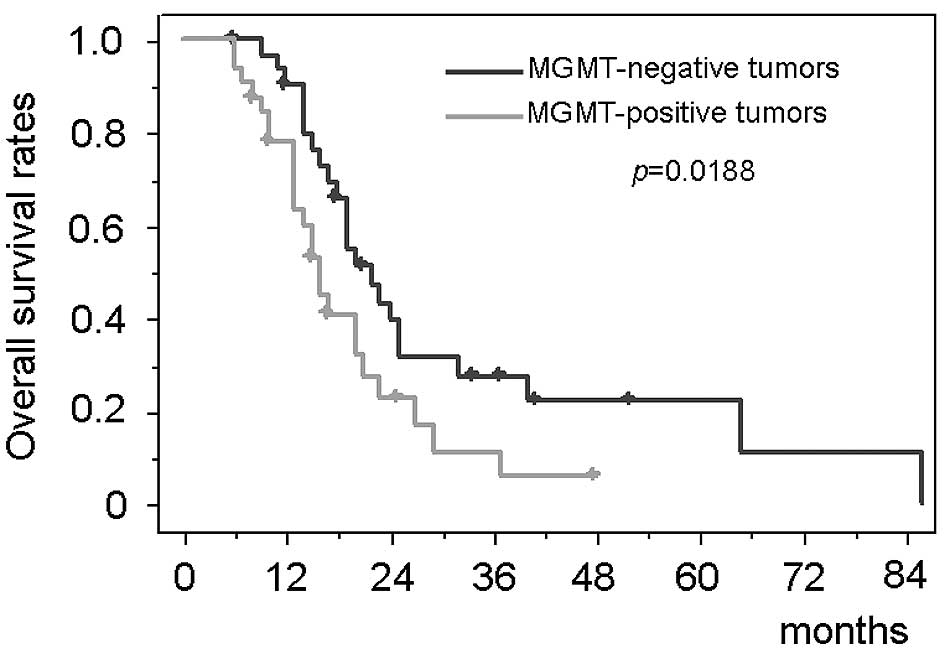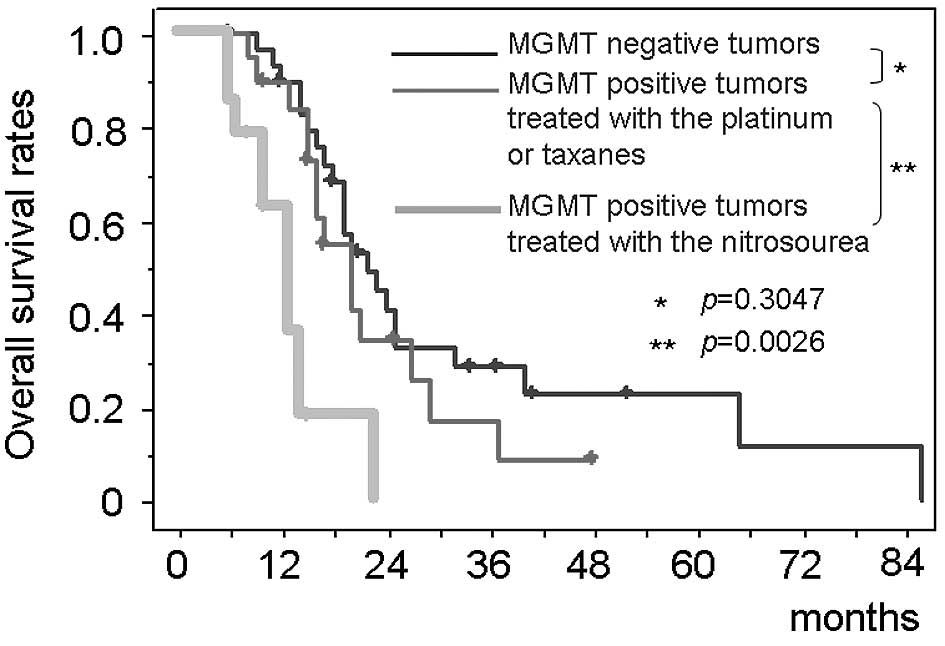|
1.
|
Shapiro WR: Current therapy for brain
tumors: back to the future. Arch Neurol. 56:429–432. 1999.
View Article : Google Scholar : PubMed/NCBI
|
|
2.
|
Medical Research Council Brain Tumor
Working Party: Randomized trial of procarbazine, lomustine and
vincristine in the adjuvant treatment of high-grade astrocytoma: a
Medical Research Council trial. J Clin Oncol. 19:509–518.
2001.PubMed/NCBI
|
|
3.
|
Glioma Meta-analysis Trialist (GMT) Group:
Chemotherapy in adult high-grade glioma: a systematic review and
meta-analysis of individual patient data from 12 randomised trials.
Lancet. 359:1011–1018. 2002. View Article : Google Scholar : PubMed/NCBI
|
|
4.
|
Stupp R, Mason WP, van den Bent MJ, et al:
European Organisation for Research and Treatment of Cancer Brain
Tumor and Radiotherapy Groups; National Cancer Institute of Canada
Clinical Trials Group: Radiotherapy plus concomitant and adjuvant
temozolomide for glioblastoma. N Engl J Med. 352:987–996. 2005.
View Article : Google Scholar
|
|
5.
|
Hegi ME, Diserens AC, Gorlia T, et al:
MGMT gene silencing and benefit from temozolomide in glioblastoma.
N Engl J Med. 352:997–1003. 2005. View Article : Google Scholar : PubMed/NCBI
|
|
6.
|
Jaeckle KA, Eyre HJ, Townsend JJ, et al:
Correlation of tumor O6-alkylguanine-DNA
methyltransferase levels with survival of malignant astrocytoma
patients treated with bis-chloroethylnitrosourea: a Southwest
Oncology Group study. J Clin Oncol. 16:3310–3315. 1998.
|
|
7.
|
Esteller M, Garcia-Foncillas J, Andion E,
et al: Inactivation of the DNA-repair gene MGMT and the clinical
response of gliomas to alkylating agents. N Engl J Med.
343:1350–1354. 2000. View Article : Google Scholar
|
|
8.
|
Brell M, Tortosa A, Verger E, et al:
Prognostic significance of O6-alkylguanine-DNA
methyltransferase determined by promoter hypermethylation and
immunohistochemical expression in anaplatic gliomas. Clin Cancer
Res. 11:5167–5174. 2005.
|
|
9.
|
Chinot OL, Barrie M, Fuentes S, et al:
Correlation between O6-alkylguanine-DNA
methyltransferase and survival in inoperable newly diagnosed
glioblastoma patients treated with neoadjuvant temozolomide. J Clin
Oncol. 25:1470–1475. 2007.PubMed/NCBI
|
|
10.
|
Cortazar P and Johnson BE: Review of the
efficacy of individualized chemotherapy selected by in vitro drug
sensitivity testing for patients with cancer. J Clin Oncol.
17:1625–1631. 1999.PubMed/NCBI
|
|
11.
|
Alonso K: Human tumor stem cell assay. A
prospective clinical trial. Cancer. 54:2475–2479. 1984. View Article : Google Scholar : PubMed/NCBI
|
|
12.
|
Von Hoff DD, Sandbach JF, Clark GM, et al:
Selection of cancer chemotherapy for a patient by an in vitro assay
versus a clinician. J Natl Cancer Inst. 82:110–116. 1990.PubMed/NCBI
|
|
13.
|
Gazdar AF, Steinberg SM, Russell EK, et
al: Correlation of in vitro drug-sensitivity testing with response
to chemotherapy and survival in extensive-stage small cell lung
cancer: a prospective clinical trial. J Natl Cancer Inst.
82:117–124. 1990. View Article : Google Scholar : PubMed/NCBI
|
|
14.
|
Cortazar P, Gazdar AF, Woods E, et al:
Survival of patients with limited-stage small cell lung cancer
treated with individualized chemotherapy selected by in vitro drug
sensitivity testing. Clin Cancer Res. 3:741–747. 1997.PubMed/NCBI
|
|
15.
|
Iwadate Y, Fujimoto S, Namba H and Yamaura
A: Promising survival for patients with glioblastoma multiforme
treated with individualised chemotherapy based on in vitro drug
sensitivity testing. Br J Cancer. 89:1896–1900. 2003. View Article : Google Scholar : PubMed/NCBI
|
|
16.
|
Iwadate Y, Fujimoto S, Sueyoshi K, et al:
Prediction of drug cytotoxicity in 9L rat brain tumor by using flow
cytometry with a deoxyribonucleic acid-binding dye. Neurosurgery.
40:782–788. 1997. View Article : Google Scholar : PubMed/NCBI
|
|
17.
|
Iwadate Y, Fujimoto S and Yamaura A:
Differential chemosensitivity in human intracerebral gliomas
measured by flow cytometric DNA analysis. Int J Mol Med.
10:187–192. 2002.PubMed/NCBI
|
|
18.
|
Alberts DS and Chen HSG: Tabular Summary
of Pharmacokinetic Parameters Relevant to In Vitro Drug Assay. Alan
R. Liss. New York: 351–359. 1980.
|
|
19.
|
Higuchi Y, Iwadate Y and Yamaura A:
Treatment of low-grade oligodendroglial tumors without
radiotherapy. Neurology. 63:2384–2386. 2004. View Article : Google Scholar : PubMed/NCBI
|
|
20.
|
Iwadate Y, Namba H and Sueyoshi K:
Intra-arterial ACNU and cisplatin chemotherapy for the treatment of
glioblastoma multiforme. Neurol Med Chir. 35:598–603. 1995.
View Article : Google Scholar : PubMed/NCBI
|
|
21.
|
Mason WP and Cairncross JG: Drug insight:
temozolomide as a treatment for malignant glioma – impact of a
recent trial. Nat Clin Pract Neurol. 1:88–95. 2005.
|
|
22.
|
Tanaka S, Kobayashi I, Utsuki S, Oka H,
Yasui Y and Fujii K: Down-regulation of
O6-methylguanine-DNA methyltransferase gene expression
in gliomas by platinum compounds. Oncol Rep. 14:1275–1280.
2005.
|
|
23.
|
Beith J, Hartley J, Darling J and Souhami
R: DNA interstrand cross-linking and cytotoxicity induced by
chloroethylnitrosoureas and cisplatin in human glioblastoma cell
lines which vary in cellular concentration of
O6-alkylguanine-DNA methyltransferase. Br J Cancer.
75:500–505. 1997. View Article : Google Scholar : PubMed/NCBI
|
|
24.
|
Preuss I, Thust R and Kaina B: Protective
effect of O6-methylguanine-DNA methyltransferase (MGMT)
on the cytotoxic and recombinigenic activity of different
antineoplastic drugs. Int J Cancer. 65:506–512. 1996.
|
|
25.
|
Fruehauf JP, Brem H, Parker R, et al: In
vitro drug response and molecular markers associated with drug
resistance in malignant gliomas. Clin Cancer Res. 12:4523–4532.
2006. View Article : Google Scholar : PubMed/NCBI
|
|
26.
|
Balana C, Ramirez JL, Rosell R, et al:
O6-methylguanine-DNA methyltransferase methylation in
serum and tumor DNA predicts response to
1,3-bis(2-chloroethyl)-1-nitrosourea but not to temozolomide plus
cisplatin in glioblastoma multiforme. Clin Cancer Res. 9:1461–1468.
2003.
|
|
27.
|
Watanabe T, Katayama Y, Ogino A, et al:
Preliminary individualized chemotherapy for malignant astrocytomas
based on O6-methylguanine-deoxyribonucleic acid
methyltransferase methylation analysis. Neurol Med Chir.
46:387–394. 2006. View Article : Google Scholar : PubMed/NCBI
|
|
28.
|
Silvani A, Eoli M, Salmaggi A, et al:
Phase II trial of cisplatin plus temozolomide, in recurrent and
progressive malignant glioma patients. J Neurooncol. 66:203–208.
2004. View Article : Google Scholar : PubMed/NCBI
|
|
29.
|
Rosenthal MA, Gruber ML, Glass J, et al:
Phase II study of combination taxol and estramustine phosphate in
the treatment of recurrent glioblastoma multiforme. J Neurooncol.
47:59–63. 2000. View Article : Google Scholar : PubMed/NCBI
|
|
30.
|
Langer CJ, Ruffer J, Rhodes H, et al:
Phase II Radiation Therapy Oncology Group trial of weekly
paclitaxel and conventional external beam radiation therapy for
supratentorial glioblastoma multiforme. Int J Radiat Oncol Biol
Phys. 51:113–119. 2001. View Article : Google Scholar
|
|
31.
|
Ashamalla H, Zaki B, Mokhtar B, et al:
Fractionated stereotactic radiotherapy boost and weekly paclitaxel
in malignant gliomas clinical and pharmacokinetics results. Technol
Cancer Res Treat. 6:169–176. 2007. View Article : Google Scholar
|
|
32.
|
Karmakar S, Banik NL and Ray SK:
Combination of all-trans retinoic acid and paclitaxel-induced
differentiation and apoptosis in human gliobastoma U87MG xenografts
in nude mice. Cancer. 112:596–607. 2008. View Article : Google Scholar : PubMed/NCBI
|
|
33.
|
Friedman HS, McLendon RE, Kerby T, et al:
DNA mismatch repair and O6-alkylguanine-DNA
alkyltransferase analysis and response to Temodal in newly
diagnosed malignant glioma. J Clin Oncol. 16:3851–3857.
1998.PubMed/NCBI
|
|
34.
|
Mollemann M, Wolter M, Feisberg J, et al:
Frequent promoter hypermethylation and low expression of the MGMT
gene in oligodendroglial tumors. Int J Cancer. 113:379–385. 2005.
View Article : Google Scholar : PubMed/NCBI
|















